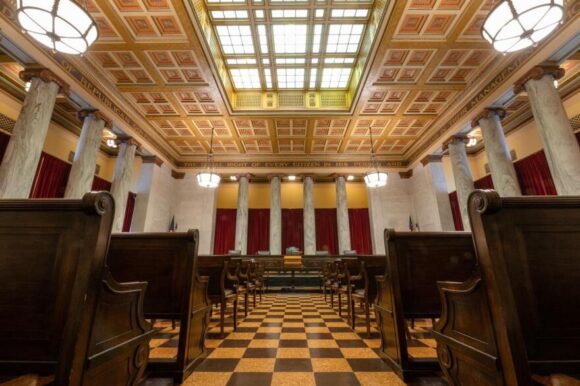A lawyer’s email and voice mail were enough to settle a claim dispute and bar further litigation, despite a petitioner’s contention that thousands of dollars in damages were left unrepaired, the West Virginia Supreme Court said in siding with Allstate Insurance.
The high court upheld a West Virginia trial court that enforced a settlement agreement between Allstate and a tenant in a rental property where pipes had frozen and burst in 2018. The justices also upheld the trial court’s order barring an amended complaint or new complaint by renter Rex Donahue.
“We conclude that that the record evidence was overwhelming that petitioner agreed that, in consideration for Allstate’s payment to Mammoth (a restoration firm) for the performance of water mitigation services …, petitioner would dismiss his third-party complaint against Allstate and ‘will dismiss and drop any suit against Allstate involving that claim on the home and the lost property,” the Supreme Court’s Feb. 18 opinion reads.
The property in Ona, West Virginia, was unoccupied when the pipes burst and flooded part of the home in early 2018. Donahue filed a claim under the landlord’s package policy, but Allstate denied the claim, asserting that a policy exclusion barred coverage for damages caused by failure to maintain adequate heat in the residence.
The opinion does not make it clear who hired Mammoth Restoration and Cleaning to perform mitigation services and repairs, but the firm filed suit in July 2018 against the tenant, seeking $6,300 for its work. Donahue then filed a third-party complaint against Allstate, arguing it was the insurer that hired the contractor and that Allstate had a duty to cover the cost.

A year later, after Allstate negotiated with Donahue’s attorney, the insurer believed it had reached a settlement agreement – to pay Mammoth $5,000 if Donahue would retire all claims against Allstate. It sent an email to that effect to Donahue’s lawyer. The lawyer, Steven Cook, of Barboursville, responded in email and voice mail that his client had agreed to the settlement.
But Donahue never signed the agreement. By November that year, Allstate asked the trial court to enforce the settlement. Donahue responded that he had agreed only to settle the contractor’s demand, but did not agree to release all other claims against Allstate. The home had sustained more than $54,000 in damages from the burst pipes, he argued. The court opinion does not go into why Donahue may have changed his mind or if he had failed to understand the proposed settlement agreement.
The circuit court dismissed the renter’s concerns and granted Allstate’s motion to enforce the settlement. Donahue appealed, but the Supreme Court agreed that the email and voice mail from his lawyer showed that Donahue’s assent was unequivocal, and that was enough to settle the issue.
“We, therefore, conclude that the circuit court did not abuse its discretion in determining that there was a meeting of the minds regarding the terms of the settlement agreement between petitioner and Allstate and that the settlement agreement must be enforced,” the opinion, written by Chief Justice John Hutchison said.
Top photo: Courtesy, West Virginia Supreme Court and WV Public Broadcasting.
Topics Virginia
Was this article valuable?
Here are more articles you may enjoy.



 The $3 Trillion AI Data Center Build-Out Becomes All-Consuming for Debt Markets
The $3 Trillion AI Data Center Build-Out Becomes All-Consuming for Debt Markets  Zurich Insurance’s Beazley Bid Sets the Stage for More Insurance Deals
Zurich Insurance’s Beazley Bid Sets the Stage for More Insurance Deals  Allstate CEO Wilson Takes on Affordability Issue During Earnings Call
Allstate CEO Wilson Takes on Affordability Issue During Earnings Call  Trump’s Repeal of Climate Rule Opens a ‘New Front’ for Litigation
Trump’s Repeal of Climate Rule Opens a ‘New Front’ for Litigation 

